JICA's Volunteer Programs support activities by citizens who volunteer with an earnest desire to cooperate in the economic and social development as well as the reconstruction of developing countries. The volunteer programs are widely recognized as representative programs of grassroots-level international cooperation extended by the Government of Japan and JICA and are highly praised by partner countries. Furthermore, the programs are expected to act as a means to develop human resources with global perspectives that are valuable to Japanese society.
The Japan Overseas Cooperation Volunteers (JOCV) program was founded and inaugurated in 1965 by the Government of Japan to provide official technical assistance to partner countries. In January 2017, the accumulated total number of JICA volunteers dispatched overseas exceeded 50,000, and the number of recipient countries reached 88. Due to JICA's contribution in this program, it was the first Japanese organization to win in August 2016 the Ramon Magsaysay Award, which is called Asia's Nobel peace prize.
The volunteer needs for addressing development challenges in each country are refined and clarified based on the Sustainable Development Goals (SDGs) adopted at the UN Sustainable Development Summit held in 2015, and formulated into concrete programs for each country and support area.
JICA's cooperation also contributes to cultivating human resources for the business globalization intended by local governments, private sector, and universities, in solving development challenges in developing countries.
Lately, JICA's volunteer programs became known as programs which not only contribute to the development of developing countries but also serve to "energize Japan and the world" through their activities and experiences living with local people in developing countries.
In Egypt, the JOCV program had been introduced in 1996. It is implementing "grass roots cooperation" as cooperation in the economic and social development based on the requests from recipient organization in Egypt.
Although volunteers can offer valuable knowledge and skills to the organizations and their staff, their attitude is more like "work together, think together, and solve the issue together." Therefore, they are rather "co-workers," than simple trainers. Moreover, this cooperation scheme may provide vibrant opportunity for the volunteers to learn and understand Egypt more, which in turn, could deepen the cultural understanding between Egypt and Japan.
Most emphasis of the volunteers in Egypt has been placed on education, represented by early childhood development, education, youth activities, art and teaching Japanese language. Also, volunteers with other widely diverse occupations have also been dispatched as social workers and supporters for persons with disabilities in the area of social welfare, as well as construction machinery, automobile maintenance, textiles and ceramics making full use of Japanese technology in the manufacturing industries.
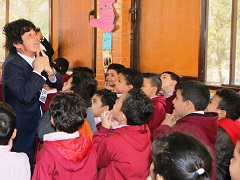
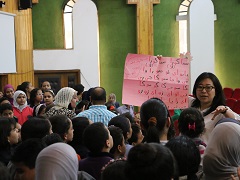
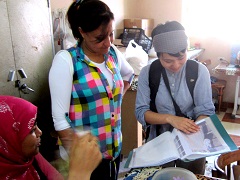
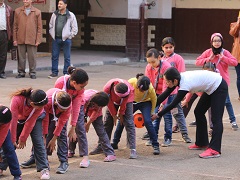
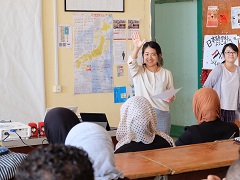






scroll